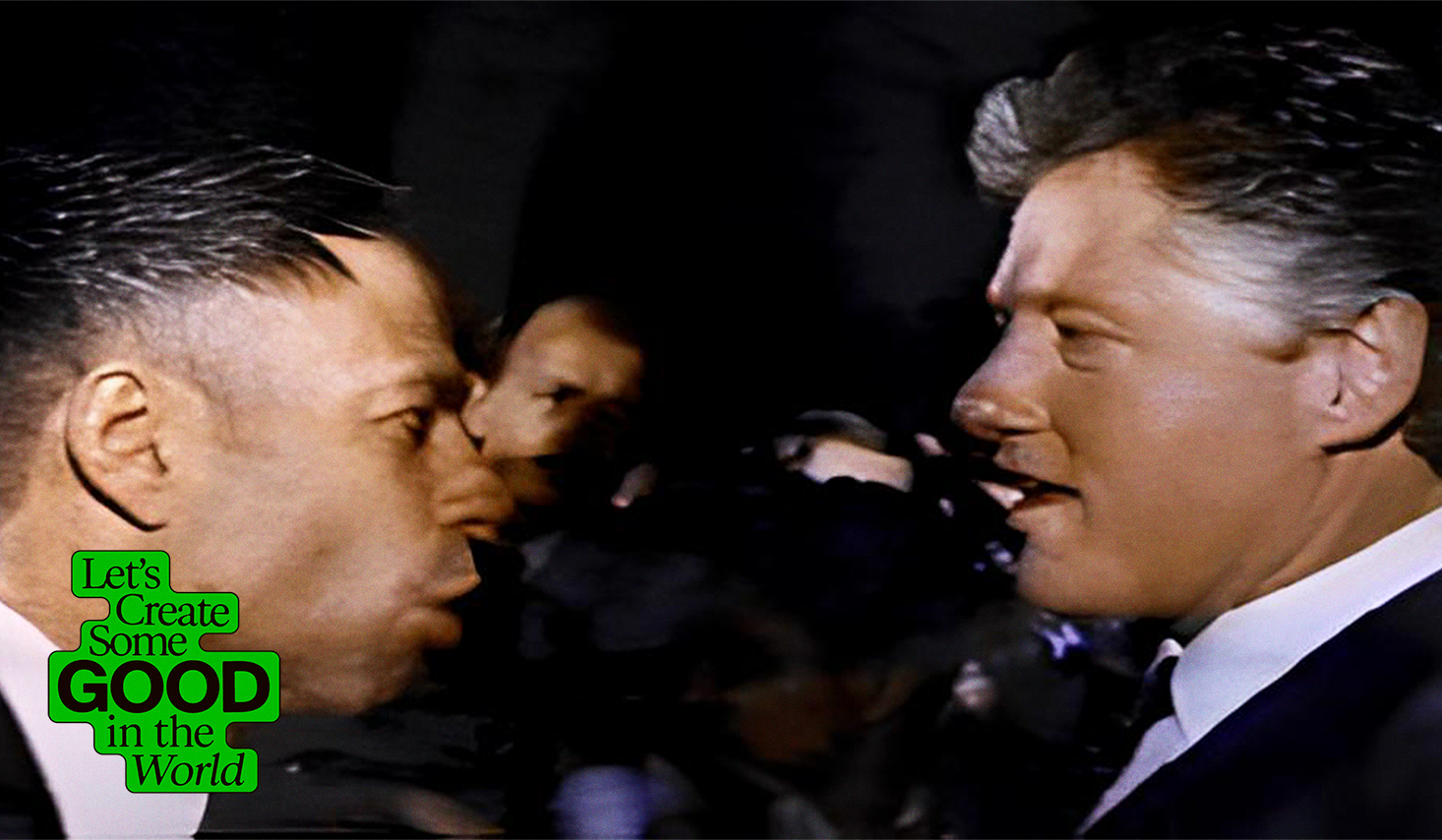
In 1992, ACT UP NY activist Bob Rafsky interrupted then-Presidential candidate Bill Clinton live on cable news at a campaign event in Midtown.
“We’re not dying of AIDS as much as we are dying of 11 years of government neglect,” Rafsky shouts. A visibly angry Clinton scolds him for being discourteous in a heated exchange. Two days later, the Clinton campaign met with ACT UP and agreed “to make a major AIDS policy speech, to have people with HIV speak to the Democratic Convention, and to sign onto the UAA’s (United for AIDS Action) five-point plan.”
Was Bob Rafsky wrong for interrupting a Clinton fundraiser while he and all his friends were dying of AIDS @ChrisDJackson? pic.twitter.com/FQi2O4aSx4
— Jason Rosenberg (@mynameisjro) March 11, 2020
This tactic is known as “birddogging”: when a private citizen or activist employs “dogged” methods to disrupt electeds, politicians, or public figures at events, at their homes, or anywhere they might see them in the flesh.
Birddogging creates a moment of friction between an activist and a politician, whether it’s Rafsky, movement icon Jennicet Gutierrez, or my friends, the organizers Jason Rosenberg and LaLa Zanell. With the influx of birddogging surrounding the climate crisis, the war on Gaza, or other US military spending, there is and always has been a hot debate that follows about whether birddogging is “appropriate” or wrong on principle. Recently, NY mag’s Jonathan Chait called it “illiberal and dangerous.”
As an outsider or someone not connected to social justice movement work, birddogging might seem rude, tactless, or improper, but this kind of direct action is often meticulously planned weeks in advance, with clear goals in mind, and shouldn’t be written off simply because it goes against perceived social norms.
Why do people think this highly effective and storied method of protest is “dangerous” or disrespectful?
Disruption is essential to most forms of protest in order to stop or pause the status quo, and has played an integral part of arguably every major civil rights movement in history. Those who seek to problematize it are likely unaware of, or are ignoring this history. They also likely do not want the issue being raised to be heard, and/or have never organized a day in their life. Birddogging is a time-honored, non-violent protest tactic that cannot and should not be quelled by respectability politics.
Birddogging creates a story that is picked up by the press, raising the activist’s issue to headlines.
Take Jennicet Gutierrez, who famously interrupted President Barack Obama during a Pride event in 2015 about his deportation policies, some of the worst of any administration. The following press hits highlighted the ways that Obama’s immigration policies hurt LGBTQ people, including, at the time, some 75 trans detainees. It also highlighted Gutierrez’s organization, Familia TQLM as a source of support and advocacy for LGBTQ immigrants.
Birddogging catches politicians off guard and on the record.
Critics of birddogging usually frame their arguments in a way that prioritizes the time, decorum, and stature of a politician over the average activist or citizen. But this line of thinking is antithetical to the very value of protest, which is a tool for creating equitable public power. Politicians get to have one-way conversations for most of their careers, working with massive PR machines and meticulously crafted speeches that side-step key issues with strategically vague language.
Birddogging creates a rare, direct line to elected officials.
There are only so many ways a private citizen can contact legislators and those with power. You can send emails or make phone calls, often read or answered by staffers who, while required by law to relay the information to their bosses, drop the message into a bucket of hundreds if not thousands of messages from constituents. Often, thanks to advocacy tools that allow for email campaigns, the messages sent are similar and repetitive in wording, sometimes making it so elected officials dismiss the concerns raised. That is not to say those tools aren’t important or effective. Still, nothing will replace the impact of showing up and having a politician see and hear demands in person.
Not all birddogs have the immediate response you’d like, but it will always surprise your target, who, as most in power do, assume they will live their lives uninterrupted.
Birddogging corners politicians into making a commitment or choice.
Sunrise movement is a group of predominantly young people working to curb the impacts of climate change by advocating for a Green New Deal and other policies that will keep the world from getting hotter and more uninhabitable. In January, they showed up at the Republican Iowa Caucuses, interrupting candidates Vivek Ramaswamy, Nikki Haley, and even Donald Trump to bring attention to their ties and financing by fossil fuel companies.
“Many politicians in both parties are beholden to Wall Street, oil and gas CEOs, and lobbyists. Birddogging is a way to shine a light on how a politician’s positions and donors are out of line with what most people want,” a representative from Sunrise Movement said via email. “A strong birddog forces politicians to make a choice: do they answer the question in a way that makes them look bad, or do they physically or metaphorically run away from the question, which also can make them look bad.”
A few things to consider before birddogging: “Get clear on your goals and then prepare for multiple scenarios, Practice, Make a plan for social media and press, and ask simple and clear questions that don’t require specific knowledge.”
Birddogging can unveil how politicians really feel about an issue.
Founded in 2002 in response to the US invasion and war in Iraq, Code Pink is a feminist, women-led grassroots organization dedicated to supporting peace and ending U.S. warfare and imperialism. Since October, they have been regular fixtures in the halls of the Senate Building, birdogging Republican and Democratic senators alike on their continued financial support of Israel.
“Part of our mission is to expose the war machine. We use birddogging as a way to hold elected officials accountable and to be visible for peace and justice,” said a representative for Code Pink. “Elected officials tend to keep themselves isolated from the rest of the world in order to avoid truth and accountability. It is easy for them to continuously pass horrendous policies while they are allowed to stay ‘hidden’ from public opinion. Bird-dogging politicians gives the public the opportunity to express dissent in a direct way that a politician cannot hide from.
“Bird-dogging incidents have viral potential, so when the media fails to cover a certain narrative, a good viral bird-dog can interject that narrative into the news,” they said.
Other things to consider are the optics, and make sure you’re ready to document: “Do you want a man going after a female politician on women’s issues, or does it make more sense to come from a woman? Plan to have multiple people with you, if possible, to film and photograph from different angles.”
It’s an opportunity to make a politician’s bad decisions look even worse:
A brand new, youth-led group is putting politicians on notice in Washington D.C. “WE DO NOT DO PETITIONS. WE DO DIRECTION ACTION” says their website, which emphasizes the need for protests in favor of elevating climate action as a top political issue. They have been boldly interrupting CEOs and elected officials for their ties to fossil fuel companies and shutting down their events.
Recently, a protester interrupted an event at Harvard University with Joe Manchin, calling him out for selling young people’s futures and accepting more money from fossil fuel industry than any else in the Senate. This testy exchange prompted Manchin to stand up to the young person, seemingly ready to put his hands on him, but instead, another person close to Manchin intervenes and pushes the protestor down to the ground. This moment picked up in the news but also points to the potential harm that can come from birddogging. While interrupting and birddogging can be effective, it can also put you at risk for violence or arrest. Depending on your issue, like these young people fighting for a liveable planet and future, it still can be worth the risk.
Birdogging reminds politicians they cannot ignore their voters:
Too often, voters are taken for granted and expected to fall in line by Election Day, regardless of any concerns they may have about how their representatives are handling issues like abortion, climate change, the attacks on gender-affirming care, or war mongering. Jewish Voices for Peace is one organization reminding the Biden administration that they cannot simply ignore how voters feel about the United States’ unflinching and unrestricted military support of Israel. At a recent fundraising event, JVP and a coalition of organizations worked to get protestors inside to disrupt.
Despite 45 of them being flagged and denied entry before the event, at least 10 protestors were able to make their way in and remind Biden that they were not going away or stopping.
“They had tried so hard to not let us in,” Sandra Tamari, executive director of the Adalah Justice Project, a Palestinian advocacy organization that helped organize the protest, told Rolling Stone. “It felt maybe in some ways it was pure luck that we could get some people in — but also a testament to the power of our moment and the size of our movement. They can’t track everyone.”
